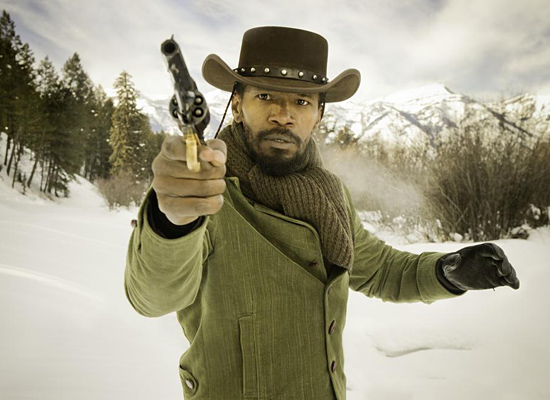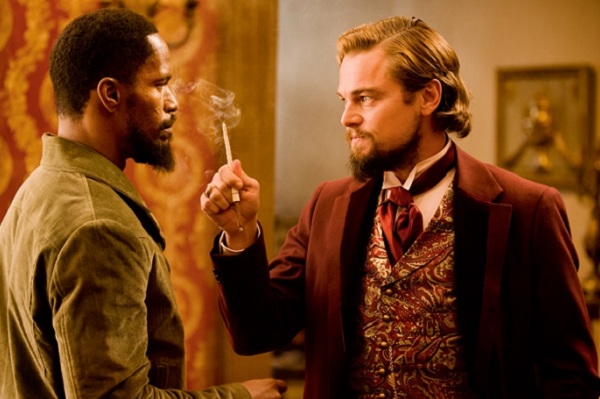13 January 2013
Directed by: Quentin Tarantino
Starring: Jamie Foxx, Christoph Waltz, Kerry Washington, Leonardo DiCaprio and Samuel L. Jackson
What It’s About: A slave-turned-bounty-hunter sets out to rescue his wife from a vicious Mississippi plantation owner.
Rated R (for strong graphic violence throughout, a vicious fight, language and some nudity)
Runtime: 165 minutes
By Aaron Sanders, Diversions Editor
Three years ago, cult director Quentin Tarantino released his fifth feature film Inglourious Basterds, providing audiences with a warped tale of a group of Jewish-American Nazi hunters during World War II. In 2012, Tarantino returned to theaters with another pulpy, heroic reiteration of history: Django Unchained.
Django tells the tale of a down-and-out slave named Django (Jamie Foxx) on a quest to rescue his beloved wife Broomhilda von Shaft (Kerry Washington). With the help and mentorship of German bounty hunter Dr. King Shultz (Christoph Waltz), Django rises from his slave roots and becomes a hero among his people.
While on the surface Django may come off as exploitative and insincere in its depiction of slavery, it pays rightful respect to the time’s victims while also having some fun while doing it.
Academy Award-winner Christoph Waltz gives another deliciously cheeky performance as an over-educated bounty hunter, who commands the screen for the first half of the film. Waltz’s domination of the film ends with the introduction of slaver Calvin Candie, played by an unrecognizable Leonardo Dicaprio. Dicaprio plays a charmingly sinister slave owner with a violent hobby of wagering on Mandingo fighting – a sport of muscle-bound slaves fighting to the death. Unfortunately, Jamie Foxx plays second fiddle to the supporting cast, but still manages to hold his own well enough for you to root for him in the end. Don Johnson and Samuel L. Jackson shine in their small roles as Big Daddy and Stephen, respectively. Sure, all the characters are really caricatures, but they are all such a delight to watch that it is excusable.
 While Inglourious Basterds was Tarantino’s most mature film, Django Unchained is quite possibly Tarantino’s most accessible film. He manages to keep his throwback/nostalgic aura intact while also avoiding any convolution, which makes it surprisingly re-watchable; I’ve personally seen it three times. At 2 hours and 45 minutes, the pacing is surprisingly fast; however, the second half of the film at Candie’s plantation is painstakingly tense.
While Inglourious Basterds was Tarantino’s most mature film, Django Unchained is quite possibly Tarantino’s most accessible film. He manages to keep his throwback/nostalgic aura intact while also avoiding any convolution, which makes it surprisingly re-watchable; I’ve personally seen it three times. At 2 hours and 45 minutes, the pacing is surprisingly fast; however, the second half of the film at Candie’s plantation is painstakingly tense.
The overall story of Django is mythic in nature. In fact, it alludes to its own intentions early on in the film. Christoph Waltz’s character, in telling it to Django, draws a parallel from a popular German myth to Django’s quest to retrieve his wife, which explains why both Django and his wife are somewhat underdeveloped. Django is the archetypal hero to his wife Broomhilda, the fallen princess. Even Dr. King Schultz is “fairy godmother”-like in his presence. He conveniently intercepts Django in a random forest in Texas, buys his freedom and gives him the tools to better himself, almost as if it some omniscient force strategically placed Schultz in Django’s path.
Django marks Tarantino’s first film since the death of his go-to film editor Sally Menke. And the change in structure is very noticeable. Replacement editor Fred Raskin does his best to emulate Sally Menke’s iconic cutting, but ends up convoluting the pace of the film. For instance, there is a scene where a brigade of clan members charges Django and Schultz’s wagon only to cut back prior to the charge for a comedy bit and then cuts back to the raid. While scenes like this may go unnoticed to the majority of people, they have a distracting effect on the overall experience.
 Tarantino still had another two hours of film that would have provided further back story and character development for virtually every existing character and introduced a handful of others. The Weinstein Company and Tarantino even considered releasing the film in two parts like with Kill Bill, but eventually decided against it. Fortunately for all the Tarantino die-hards, he is contemplating releasing the full version sometime after Django makes its rounds around the world. So if you don’t catch it in its initial theatrical run, it is likely it will return to the multiplex in time.
Tarantino still had another two hours of film that would have provided further back story and character development for virtually every existing character and introduced a handful of others. The Weinstein Company and Tarantino even considered releasing the film in two parts like with Kill Bill, but eventually decided against it. Fortunately for all the Tarantino die-hards, he is contemplating releasing the full version sometime after Django makes its rounds around the world. So if you don’t catch it in its initial theatrical run, it is likely it will return to the multiplex in time.
Django Unchained ranks up there on my personal favorites list behind Kill Bill Vol. 1 & 2, my favorite Quentin Tarantino movie/movies. Despite some awkward editing and somewhat underdeveloped protagonist, Django Unchained is an entertaining, shocking, touching, heroic film and the best of 2012. And having seen it three times already, I’m eager to see it a fourth.
10/10
Courtesy of nyulocal.com, cdn.pastemagazine.com and www.film.com

